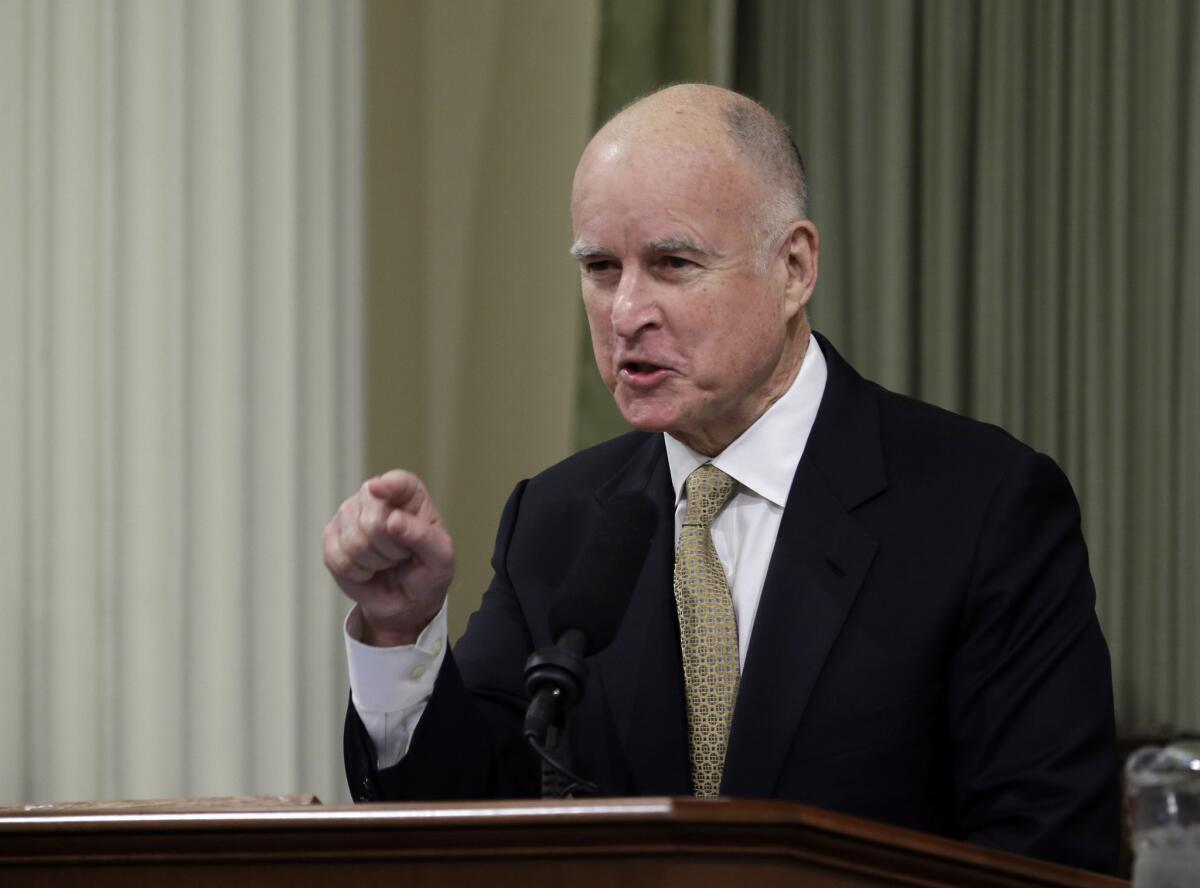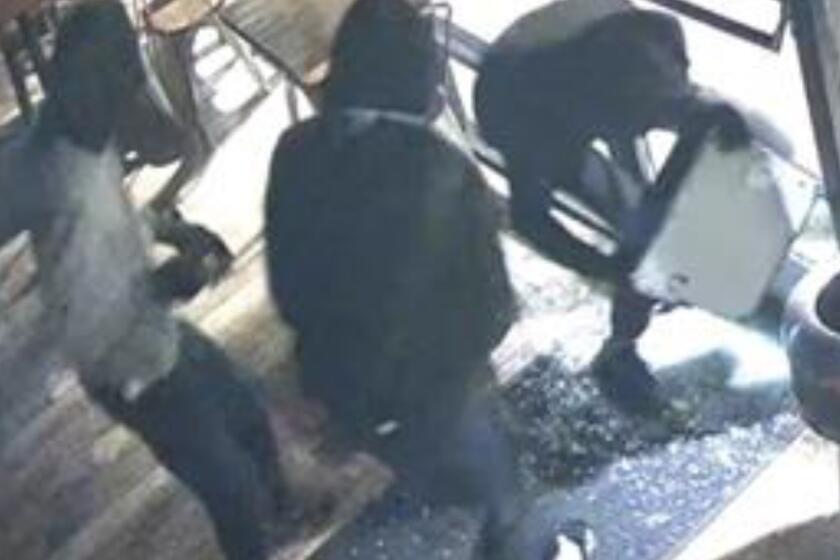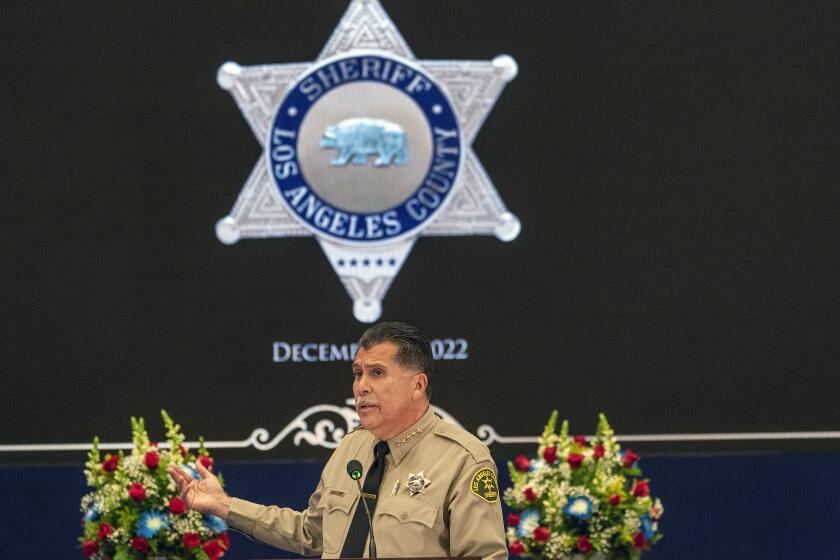Brown ignores important issues in State of the State address

SACRAMENTO — So the state of the state’s governor is static — at least until he is safely reelected.
Until the election year blows over, Gov. Jerry Brown is stationary — in a crouch, protecting himself politically, satisfied with the status quo.
In his 30th year in elective office — 12th as governor, after failing in three bids for the presidency and one for the U.S. Senate, and growing up watching his politician father — Brown is instinctively cautious when running the campaign trail. Even if this time it seems a no-sweat jaunt. There’ll be no tripping over potholes.
That was the take-away from Wednesday’s State of the State address to the Legislature, an annual feel-good pageant that includes all statewide elected officials and the California Supreme Court.
Traditionally, governors have promoted bold new proposals in a State of the State speech. But this governor, at this moment, wasn’t seeking kudos for courage. Brown’s address was as predictable and unexciting as his prospective reelection in November to a record fourth term.
Everyone knew what was coming: the warning. Citing scripture, he quoted Joseph advising the Pharaoh: “‘Put away your surplus during the years of great plenty so you will be ready for the lean years which are sure to follow.’”
“Fiscal discipline is not the enemy of our democracy but its fundamental predicate,” Brown continued. “To avoid the mistakes of the past, we must spend with great prudence.”
And who can argue with that? Not his natural political enemy, certainly.
“He sounds more Republican each day,” read a headline on a GOP press release.
Brown boasted about a “California comeback” during his reign, “and what a comeback it is: A million new jobs since 2010, a budgetary surplus in the billions....”
Yes, the state — particularly its government — is in much better shape than when Brown reoccupied the office three years ago as the nation was struggling out of a devastating recession. But it’s still in worse shape than it could be.
Sacramento’s “wall of debt” — as Brown calls it — has been reduced from about $35 billion to $25 billion, and the governor intends to eliminate it completely by mid-2018. But that involves only internal borrowing and payment deferrals.
Greatly overshadowing that is a great wall of unfunded future liabilities for state employees’, teachers’, University of California and judges’ pensions, plus state employees’ and UC retirees’ healthcare. It totals $218 billion. The most troubling is a $80-billion liability for the teachers’ pension system, which — at the current rate — could go broke in 30 years. It needs an extra $4.5 billion annually.
“Our long-term liabilities are enormous and ever growing,” the governor acknowledged, adding to the unfunded list $65 billion for highway and other infrastructure repairs. Plus, he admitted, there are “uncertain costs” for Obamacare.
But if Brown had any solutions for these fiscal time bombs, he wasn’t saying.
Yes, California’s unemployment rate is down from 12.3% in 2010 to 8.5% at latest check, but that’s still fifth worst in the nation.
We’ve got the least friendly business climate in America — based on what business organizations say — and a big reason is a regulatory quagmire.
Last year, Brown drew praise from business groups for calling in his State of the State address for regulatory streamlining, especially of the frequently abused California Environmental Quality Act. Too often, the act isn’t used for environmental protection at all. It’s the tool of business rivals trying to block competition or labor groups attempting to force unionization.
But pushing reform means bucking labor, the cash cow of Democratic election campaigns. Brown didn’t do that last year, and he certainly isn’t about to while running for reelection. The issue wasn’t even mentioned in his speech Wednesday.
Brown deserves credit — by holding down spending and increasing taxes — for transforming a $27-billion budget deficit when he took office into a projected $3.3-billion surplus by July 1.
But the root cause of Sacramento’s budget instability is a volatile income tax system that leans too heavily on the rich and an outdated sales tax that excludes services. Brown, however, isn’t about to even whisper “tax reform” this year.
In his speech, the governor carefully steered away from controversy — even projects he aggressively has been pushing.
There was only scant mention of the bullet train: “We’re building the nation’s only high-speed rail.” Then he sped ahead.
The word “tunnels” didn’t cross his lips, although he’s trying to ramrod a $25-billion twin-tunnel project under the Sacramento-San Joaquin river delta that angers local farmers and state environmentalists. He did call for “further progress on the Bay Delta Conservation Plan” — the formal name for the tunnels.
But progress on that plan will require delta ecological restoration. And restoration will necessitate a state water bond. No mention of that, either. In fact, Brown is trying to avoid placing a bond on the same ballot with him.
Give Brown credit, however, for not spewing a line of blarney. He may have been guilty of omitting, but not exaggerating — which has not always been true of governors in their State of the State addresses.
It was also refreshing to again see a politician read from a written text — one he wrote himself — and not from a teleprompter. Reading from print on paper, even if he’s looking down at the podium, just seems more sincere.
And he didn’t waste a lot of frivolous verbiage. No neck-twisting gallery introductions. The speech thankfully lasted only 17 minutes.
But for major moves on a policy agenda, we’ll need to wait until 2015.
It’s too bad the employer-public must put up with its political hires taking off during election years.
More to Read
Start your day right
Sign up for Essential California for news, features and recommendations from the L.A. Times and beyond in your inbox six days a week.
You may occasionally receive promotional content from the Los Angeles Times.







